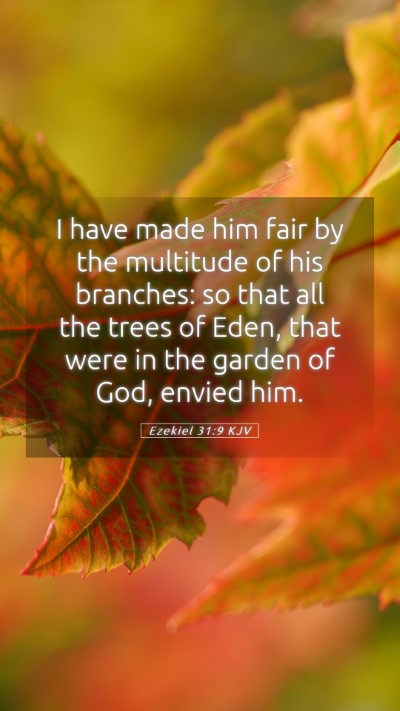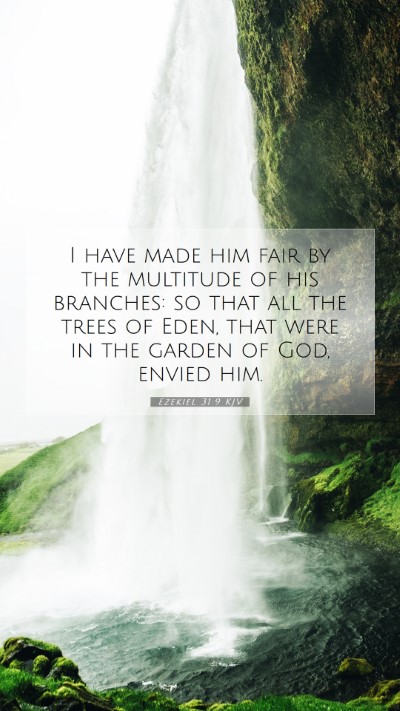Ezekiel 31:9 Explained
The verse Ezekiel 31:9 states:
"I made the nations to shake at the sound of his fall, when I cast him down to hell with them that descend into the pit: and all the trees of Eden, the choice and best of Lebanon, all that drink water, shall be comforted in the nether parts of the earth."
Summary of Meaning
Ezekiel 31:9 is a part of a larger allegory in which God uses the metaphor of a mighty tree, representing the king of Assyria or other powerful nations, to illustrate the downfall of arrogance and pride. This verse signifies the impact of this fall, not just on the nation that fell, but also on other nations and leaders. The imagery of trees being "comforted" in the nether parts symbolizes the collective remembrance and recognition of strength once admired but now diminished.
Insights from Commentators
-
Matthew Henry:
Henry emphasizes the prideful nature of those who are elevated in power, comparing them to a grand cedar in Lebanon that, despite its height and strength, ultimately faces judgment. The shaking of nations indicates how significant leaders influence the surrounding peoples.
-
Albert Barnes:
Barnes notes that the "trees of Eden" represent those nations that were once associated with glory and beauty. They too share in the sorrow of the fallen leader, indicating the interconnectedness of power and the inevitable lament that follows the collapse of great nations.
-
Adam Clarke:
Clarke focuses on the theological implications of God's sovereignty over nations. His commentary suggests that God not only creates but also brings down rulers to accomplish His purposes. The reference to hell signifies a stark judgment for those who have elevated themselves against God.
Theological Implications
This verse speaks to the theme of God's judgment on earthly powers and the transient nature of pride. It emphasizes that what stands tall today can be brought low tomorrow under divine authority. Through this lens, believers gain a deeper understanding of humility and the importance of recognizing God's ultimate control over the affairs of men and nations.
Application of the Verse
For Christians, Ezekiel 31:9 serves as a powerful reminder to practice humility in their own lives and circumstances. It emphasizes the importance of submission to God's will and warns against the hubris that can arise from success and power. In a practical sense, this verse calls individuals to seek wisdom in their actions, ensuring they do not exalt themselves in ways that could lead to their downfall.
Cross References
- Isaiah 14:12-15: This passage discusses the fall of Lucifer, drawing parallels between pride and subsequent judgment.
- Jeremiah 48:29-30: This scripture reflects on the pride and arrogance of Moab and foreshadows their downfall.
- Ezekiel 28:17: Another portion of Ezekiel that focuses on pride leading to ruin, this time regarding the king of Tyre.
Further Bible Study Insights
This verse opens avenues for both private and group Bible study discussions on themes of pride, judgment, and the nature of power. In-depth analyses may include:
- Exploring the historical context of Assyrian power.
- Discussing the symbolic language used throughout Ezekiel.
- How to apply the biblical principle of humility in contemporary life.
Conclusion
Understanding Ezekiel 31:9 through these commentaries offers profound insights into the nature of God's sovereignty, the pitfalls of pride, and the importance of humility. Through diligent study and contemplation, believers can better apply these lessons in their daily lives, leading to a richer faith and deeper relationship with God.


